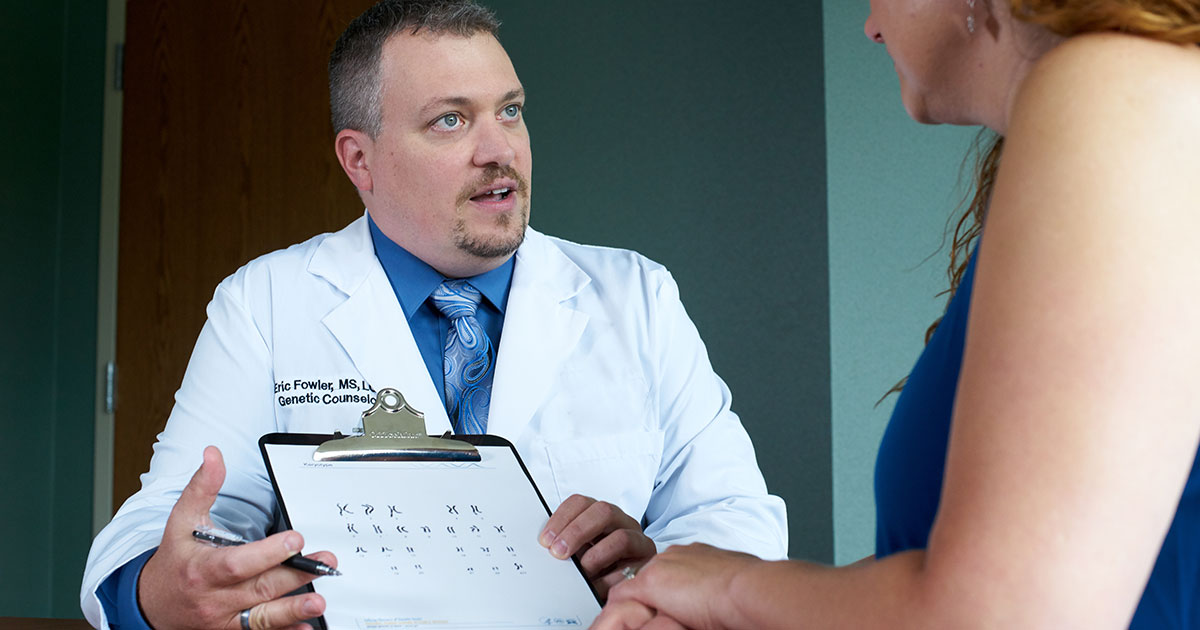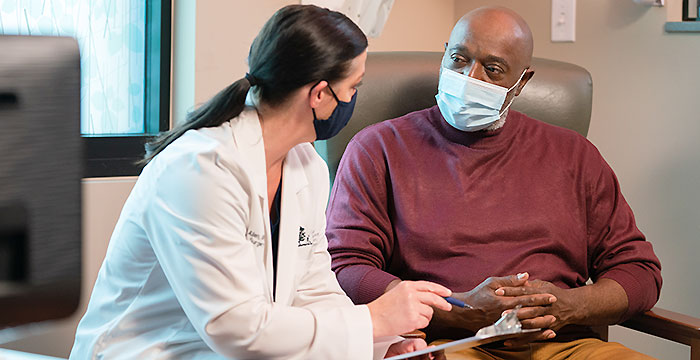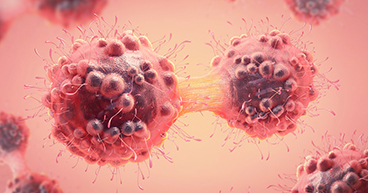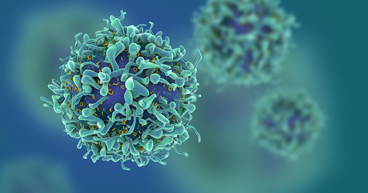
Is cancer genetic? Are “light” cigarettes safer? Do biopsies spread cancer? Are tumors contagious?
The answer to all of these questions is: no. And yet, they are among the most common myths and misconceptions about cancer, according to the National Cancer Institute.
Myths surrounding cancer are as old as the disease itself. For example, in 460 B.C., in ancient Greece, Hippocrates adopted the belief that having too much black bile in the body is what causes cancer. No one came along to dispute the claim for the next 1,400 years.
Falsehoods about how cancer starts and spreads may seem harmless, particularly since some of these notions are rooted in older, long-disproven theories. But wrong ideas about cancer can lead to needless worry, create barriers to taking prevention steps and even hinder treatment decisions.
That’s why knowing the truth about cancer, and the fictions that surround it, can help you make good decisions about prevention and treatment, should you develop the disease.
To help you understand the facts, and falsehoods, that surround cancer, this article examines five common myths disproven by the latest science-based information, including answers to the follow common questions:
- Is cancer mostly hereditary?
- Does smoking “light” cigarettes lower your risk?
- Are tumors contagious?
- Do biopsies spread cancer?
- Is cancer a death sentence?
- Understanding risk factors
If you’re interested in getting screened for cancer or if you’ve been diagnosed with cancer and want a second opinion, call us or chat online with a member of our team.
Is cancer mostly hereditary?
If you believe that cancer runs in families, you are not alone. About 84 percent of Americans believe inherited genetic mutations are one of the top five cancer risk factors, according to the American Institute for Cancer Research (AICR).
Yet while people born with certain genetic mutations, like BRCA and HER2, are at an increased risk, the truth is that most cancers aren’t caused by these genes or other hereditary factors.
Still, because of this belief, many people are more focused on inherited cancer risk, which is responsible for no more than 10 percent of cancers, than on taking preventive steps to protect themselves, like wearing sunscreen, maintaining a healthy weight and limiting alcohol use.
The AICR 2019 Cancer Risk Awareness Survey, in fact, found that fewer than half of Americans understand that lifestyle behaviors like drinking alcohol, eating an unhealthy diet and not getting enough physical activity are linked to cancer.
Americans aren’t alone in their confusion.
According to a recently published 2021 survey by the French National Cancer Institute, nearly 67 percent of French respondents believe that cancer is a hereditary disease. The authors of the survey say the misconception regarding the role of genetics in cancer development can “lead people to think that prevention measures are unnecessary because cancer is inherited.”
Scientific research has found certain lifestyle changes can protect you and reduce your risk for developing cancer, regardless of your family’s medical history and your own genetic profile.
Does smoking “light” cigarettes lower your risk?
The short answer to this question is: no. Many smokers chose so-called “light,” low-tar, mild or ultralight cigarettes believing they expose them to less tar and would be less harmful to their health than regular or full-flavor cigarettes.
The French National Cancer Institute survey found, for instance, that “respondents clearly understand that smoking carries a risk, but many think that light smoking or smoking for a short time doesn’t carry any risks,” that “pollution is more likely to cause cancer than smoking,” and that “exercising cleans your lungs of tobacco.”
But the truth is that light cigarettes are no safer than regular cigarettes, according to the National Cancer Institute. In fact, there is no such thing as a safe cigarette and no safe level of tobacco use. All tobacco products are harmful and cause cancer, including cigars, roll-your-own cigarettes and chew tobacco.
People who smoke any kind of tobacco are at much greater risk of lung cancer than people who do not smoke. Smoking harms nearly every organ of the body. People who switch to light cigarettes from regular smokes are likely to inhale the same amount of toxic chemicals, and are at high risk of developing smoking-related cancers and other diseases.
Tobacco is associated with increased risk for at least 17 cancer types, including:
- Lung cancer
- Bladder cancer
- Breast cancer
- Cervical cancer
- Colorectal cancer
- Liver cancer
- Pancreatic cancer
- Esophageal cancer
- Mouth and throat cancer
- Kidney cancer
- Stomach cancer
- Acute myeloid leukemia.
Most Americans—close to 90 percent, in fact—understand that smoking can increase cancer risk. Still, that means up to 10 percent of Americans may not know of the association. That’s concerning when you consider that smoking tobacco products, like cigarettes and cigars, causes nearly nine out of every 10 cases of lung cancer in the United States and is the leading cause of cancer deaths worldwide.
The only guaranteed way to reduce the risk to your health, as well as the risk to others, is to stop smoking completely. In fact, the biggest prevention measure you can take to reduce your overall risk of developing cancer is not smoking, or stopping if you already smoke, according to the National Cancer Institute.
Are tumors contagious?
In general, no. Cancer is not a contagious disease that easily spreads from person to person, the NCI notes. However, a person who receives an organ or tissue transplant from a donor who had cancer in the past may be at increased risk of developing a transplant-related cancer in the future.
Even so, that risk is extremely low—an estimated two cases of cancer for every 10,000 organ transplants. But that’s why doctors avoid the use of organs or tissue from donors who have a history of cancer.
It’s also true that in some people, cancers may be caused by certain viruses (some types of human papillomavirus, or HPV, for example) and bacteria (such as Helicobacter pylori) that can spread from person to person. However, the cancers they sometimes cause cannot spread from person to person.
Do biopsies spread cancer?
The chance that surgery will cause cancer to spread to other parts of the body is extremely low. Surgeons use special methods and take many steps to prevent cancer cells from spreading during biopsies or surgery to remove tumors.
For instance, if they must remove tissue from more than one area of the body, they use different surgical tools for each area.
Is cancer a death sentence?
For many people, a cancer diagnosis may feel like a death sentence. But the reality is, the likelihood of dying from cancer has dropped steadily since the 1990s in the United States.
The five-year relative survival rates for some cancers, such as breast cancer, prostate cancer and thyroid cancer, now are 90 percent or better, according to the NCI’s Annual Report to the Nation on the Status of Cancer.
The five-year relative survival rate for all cancers combined is currently about 68 percent, thanks to advances in early diagnosis, treatment and prevention efforts.
It is important to note, however, that how long an individual cancer patient will live depends on many factors, including whether the cancer is slow or fast growing, how much the cancer has spread in the body, whether effective treatments are available, the person’s overall health, and more.
Lifestyle factors are also important determinants of cancer risk. How you live your life affects your cancer risk—more than most realize. Here’s a rundown of cancer risk factors that you can control to protect yourself from the disease.

Understanding cancer risk factors
After getting to know these common myths about cancer risk, it’s also a good idea to find out about several factors that may increase the risk of developing cancer.
Obesity and cancer
Maintaining a healthy body weight is an important way you can protect yourself from developing cancer and recovering from it if you are receiving treatment. Being overweight or obese is linked to 13 types of cancer and accounts for more than 684,000 cases—40 percent of all diagnoses—each year. If obesity rates continue to climb, by the year 2030, there may be 500,000 additional cases of cancer than there would be otherwise.
Being overweight or obese may cause changes in the body, such as chronic inflammation, that can lead to cancer development. Also, fat cells produce hormones, especially estrogen, that may feed hormone-positive tumors.
The AICR survey found that only 46 percent of Americans know that diets high in fat are linked to cancer risk. Similarly, only 39 percent of Americans, or roughly four out of 10, understand that not getting enough physical activity increases risk. On the other hand, engaging in physical activity has been found to lower the risk of certain kinds of cancer—so does eating a healthy diet that’s mostly plant-based.
Physical activity is linked both directly and indirectly to cancer protection: It helps regulate the body’s hormone levels and prevents the buildup of excess body fat.
Alcohol and cancer
More than 50 percent of Americans aren’t aware of the association between alcohol and cancer, yet it accounts for up to 6 percent of all cancers and 4 percent of all cancer deaths in the United States, with links to the following cancer types:
- Breast cancer
- Colorectal cancer
- Esophageal cancer
- Head and neck cancer
- Liver cancer
All forms of alcohol—from beer to liquor to wine—may cause harmful effects on the body, but messages about the heart-healthy benefits of moderate alcohol consumption (think red wine) may have caused people to overlook its link to increased cancer risk.
The U.S. Department of Agriculture’s Dietary Guidelines for Americans 2020-2025 recommends that people who do drink alcohol limit their consumption—to two alcoholic drinks or fewer per day for men and one or fewer a day for women.
Stress and cancer
When we’re stressed, our bodies release hormones—called epinephrine and norepinephrine—that increase our blood pressure, heart rate and blood sugar levels. This release stimulates the body’s fight-or-flight response. It’s when this response stays active and becomes chronic that it can be harmful.
Studies have linked chronic stress to health problems like heart disease, high blood pressure and a weakened immune system. Still, the link between stress and cancer itself isn’t clear.
What is known is that chronic stress increases the body’s levels of cortisol, a hormone associated with weight gain, which may then trigger an inflammatory response that can lead to a chronic cycle of increased weight gain and increased inflammation.
Just more than half—roughly 54 percent—of Americans are aware of the relationship between stress and cancer. In the French survey, respondents showed that, while they know there’s a connection, their understanding of it is murky. For example, the majority said they don’t see “working at night” as a cancer risk, but do see “not being able to express one’s feelings,” “having been weakened by traumatic experiences” and “being exposed to the stress of modern life” as risk factors, although there’s no evidence to support those beliefs.
Ultraviolet rays and cancer
The most common type of cancer is skin cancer. While most Americans are aware of the link between excessive sun exposure and cancer, a 2021 survey by the American Academy of Dermatology (AAD) found that one-third of Americans don’t have a basic understanding of skin cancer and sun protection.
For example, the survey found that more than half of people don’t know that shade can protect them from the sun’s ultraviolet rays, and 31 percent aren’t aware that tanning may cause skin cancer.
The AAD recommends that people take steps to protect themselves from sun exposure when outside, including:
- Seeking shade, especially when the sun’s rays are strongest—between 10 a.m. and 2 p.m.
- Wearing sun-protective clothes, such as a wide-brimmed hat and a long-sleeved shirt.
- Using sunscreen with an SPF of 30 or higher and reapplying every two hours, or after swimming or sweating.
The takeaway: Taking steps to live a healthy lifestyle—maintaining a healthy weight, managing stress, limiting alcohol consumption, breastfeeding and protecting yourself from too much sun—can lower your cancer risk, even if you have a genetic predisposition to cancer.
The more you know about cancer’s true risk factors—and the myths that can lead to confusion—the greater your odds of protecting yourself from the disease.
If you’re interested in getting screened for cancer or if you’ve been diagnosed with cancer and want a second opinion, call us or chat online with a member of our team.



